- Home
- Anthony Trollope
Autobiography of Anthony Trollope
Autobiography of Anthony Trollope Read online
Autobiography of Anthony Trollope
Anthony Trollope
Энтони Троллоп
EBook of Autobiography of Anthony Trollope by Anthony Trollope (www.anthonytrollope.com)
Autobiography of Anthony Trollope
Preface
It may be well that I should put a short preface to this book. In
the summer of 1878 my father told me that he had written a memoir
of his own life. He did not speak about it at length, but said
that he had written me a letter, not to be opened until after his
death, containing instructions for publication.
This letter was dated 30th April, 1876. I will give here as much
of it as concerns the public: "I wish you to accept as a gift from
me, given you now, the accompanying pages which contain a memoir
of my life. My intention is that they shall be published after
my death, and be edited by you. But I leave it altogether to your
discretion whether to publish or to suppress the work;--and also
to your discretion whether any part or what part shall be omitted.
But I would not wish that anything should be added to the memoir.
If you wish to say any word as from yourself, let it be done in
the shape of a preface or introductory chapter." At the end there
is a postscript: "The publication, if made at all, should be effected
as soon as possible after my death." My father died on the 6th of
December, 1882.
It will be seen, therefore, that my duty has been merely to pass
the book through the press conformably to the above instructions.
I have placed headings to the right-hand pages throughout the book,
and I do not conceive that I was precluded from so doing. Additions
of any other sort there have been none; the few footnotes are my
father's own additions or corrections. And I have made no alterations.
I have suppressed some few passages, but not more than would amount
to two printed pages has been omitted. My father has not given any
of his own letters, nor was it his wish that any should be published.
So much I would say by way of preface. And I think I may also give
in a few words the main incidents in my father's life after he
completed his autobiography.
He has said that he had given up hunting; but he still kept two
horses for such riding as may be had in or about the immediate
neighborhood of London. He continued to ride to the end of his
life: he liked the exercise, and I think it would have distressed
him not to have had a horse in his stable. But he never spoke
willingly on hunting matters. He had at last resolved to give up
his favourite amusement, and that as far as he was concerned there
should be an end of it. In the spring of 1877 he went to South
Africa, and returned early in the following year with a book on
the colony already written. In the summer of 1878, he was one of
a party of ladies and gentlemen who made an expedition to Iceland
in the "Mastiff," one of Mr. John Burns' steam-ships. The journey
lasted altogether sixteen days, and during that time Mr. and Mrs.
Burns were the hospitable entertainers. When my father returned,
he wrote a short account of How the "Mastiffs" went to Iceland.
The book was printed, but was intended only for private circulation.
Every day, until his last illness, my father continued his work.
He would not otherwise have been happy. He demanded from himself
less than he had done ten years previously, but his daily task was
always done. I will mention now the titles of his books that were
published after the last included in the list which he himself has
given at the end of the second volume:--
An Eye for an Eye, . . . . 1879
Cousin Henry, . . . . . . 1879
Thackeray, . . . . . . . 1879
The Duke's Children, . . . . 1880
Life of Cicero, . . . . . 1880
Ayala's Angel, . . . . . 1881
Doctor Wortle's School, . . . 1881
Frau Frohmann and other Stories, . 1882
Lord Palmerston, . . . . . 1882
The Fixed Period, . . . . . 1882
Kept in the Dark, . . . . . 1882
Marion Fay, . . . . . . 1882
Mr. Scarborough's Family, . . . 1883
At the time of his death he had written four-fifths of an Irish
story, called The Landleaguers, shortly about to be published; and
he left in manuscript a completed novel, called An Old Man's Love,
which will be published by Messrs. Blackwood & Sons in 1884.
In the summer of 1880 my father left London, and went to live at
Harting, a village in Sussex, but on the confines of Hampshire. I
think he chose that spot because he found there a house that suited
him, and because of the prettiness of the neighborhood. His last
long journey was a trip to Italy in the late winter and spring of
1881; but he went to Ireland twice in 1882. He went there in May
of that year, and was then absent nearly a month. This journey did
him much good, for he found that the softer atmosphere relieved
his asthma, from which he had been suffering for nearly eighteen
months. In August following he made another trip to Ireland, but
from this journey he derived less benefit. He was much interested
in, and was very much distressed by, the unhappy condition of the
country. Few men know Ireland better than he did. He had lived
there for sixteen years, and his Post Office word had taken him
into every part of the island. In the summer of 1882 he began his
last novel, The Landleaguers, which, as stated above, was unfinished
when he died. This book was a cause of anxiety to him. He could not
rid his mind of the fact that he had a story already in the course
of publication, but which he had not yet completed. In no other
case, except Framley Parsonage, did my father publish even the
first number of any novel before he had fully completed the whole
tale.
On the evening of the 3rd of November, 1882, he was seized with
paralysis on the right side, accompanied by loss of speech. His
mind had also failed, though at intervals his thoughts would return
to him. After the first three weeks these lucid intervals became
rarer, but it was always very difficult to tell how far his mind
was sound or how far astray. He died on the evening of the 6th of
December following, nearly five weeks from the night of his attack.
I have been led to say these few words, not at all from a desire
to supplement my father's biography of himself, but to mention the
main incidents in his life after he had finished his own record. In
what I have here said I do not think I have exceeded his instructions.
Henry M. Trollope.
September, 1883.
CHAPTER I My education 1815-1834
In writing these pages, which, for the want of a better name, I shall
be fain to call the autobiograp
hy of so insignificant a person as
myself, it will not be so much my intention to speak of the little
details of my private life, as of what I, and perhaps others round
me, have done in literature; of my failures and successes such as
they have been, and their causes; and of the opening which a literary
career offers to men and women for the earning of their bread. And
yet the garrulity of old age, and the aptitude of a man's mind to
recur to the passages of his own life, will, I know, tempt me to say
something of myself;--nor, without doing so, should I know how to
throw my matter into any recognised and intelligible form. That I,
or any man, should tell everything of himself, I hold to be impossible.
Who could endure to own the doing of a mean thing? Who is there
that has done none? But this I protest:--that nothing that I say
shall be untrue. I will set down naught in malice; nor will I give
to myself, or others, honour which I do not believe to have been
fairly won. My boyhood was, I think, as unhappy as that of a young
gentleman could well be, my misfortunes arising from a mixture of
poverty and gentle standing on the part of my father, and from an
utter want on my part of the juvenile manhood which enables some
boys to hold up their heads even among the distresses which such
a position is sure to produce.
I was born in 1815, in Keppel Street, Russell Square; and while a
baby, was carried down to Harrow, where my father had built a house
on a large farm which, in an evil hour he took on a long lease from
Lord Northwick. That farm was the grave of all my father's hopes,
ambition, and prosperity, the cause of my mother's sufferings, and
of those of her children, and perhaps the director of her destiny
and of ours. My father had been a Wykamist and a fellow of New
College, and Winchester was the destination of my brothers and
myself; but as he had friends among the masters at Harrow, and as
the school offered an education almost gratuitous to children living
in the parish, he, with a certain aptitude to do things differently
from others, which accompanied him throughout his life, determined
to use that august seminary as "t'other school" for Winchester, and
sent three of us there, one after the other, at the age of seven.
My father at this time was a Chancery barrister practising in
London, occupying dingy, almost suicidal chambers, at No. 23 Old
Square, Lincoln's Inn,--chambers which on one melancholy occasion
did become absolutely suicidal. [Footnote: A pupil of his destroyed
himself in the rooms.] He was, as I have been informed by those
quite competent to know, an excellent and most conscientious lawyer,
but plagued with so bad a temper, that he drove the attorneys from
him. In his early days he was a man of some small fortune and of
higher hopes. These stood so high at the time of my birth, that
he was felt to be entitled to a country house, as well as to that
in Keppel Street; and in order that he might build such a residence,
he took the farm. This place he called Julians, and the land runs
up to the foot of the hill on which the school and the church
stand,--on the side towards London. Things there went much against
him; the farm was ruinous, and I remember that we all regarded the
Lord Northwick of those days as a cormorant who was eating us up.
My father's clients deserted him. He purchased various dark gloomy
chambers in and about Chancery Lane, and his purchases always went
wrong. Then, as a final crushing blow, and old uncle, whose heir he
was to have been, married and had a family! The house in London was
let; and also the house he built at Harrow, from which he descended
to a farmhouse on the land, which I have endeavoured to make known
to some readers under the name of Orley Farm. This place, just as it
was when we lived there, is to be seen in the frontispiece to the
first edition of that novel, having the good fortune to be delineated
by no less a pencil than that of John Millais.
My two elder brothers had been sent as day-boarders to Harrow
School from the bigger house, and may probably have been received
among the aristocratic crowd,--not on equal terms, because a
day-boarder at Harrow in those days was never so received,--but at
any rate as other day-boarders. I do not suppose that they were well
treated, but I doubt whether they were subjected to the ignominy
which I endured. I was only seven, and I think that boys at seven
are now spared among their more considerate seniors. I was never
spared; and was not even allowed to run to and fro between our house
and the school without a daily purgatory. No doubt my appearance
was against me. I remember well, when I was still the junior boy
in the school, Dr. Butler, the head-master, stopping me in the
street, and asking me, with all the clouds of Jove upon his brow
and the thunder in his voice, whether it was possible that Harrow
School was disgraced by so disreputably dirty a boy as I! Oh, what
I felt at that moment! But I could not look my feelings. I do not
doubt that I was dirty;--but I think that he was cruel. He must
have known me had he seen me as he was wont to see me, for he was
in the habit of flogging me constantly. Perhaps he did not recognise
me by my face.
At this time I was three years at Harrow; and, as far as I can
remember, I was the junior boy in the school when I left it.
Then I was sent to a private school at Sunbury, kept by Arthur
Drury. This, I think, must have been done in accordance with the
advice of Henry Drury, who was my tutor at Harrow School, and my
father's friend, and who may probably have expressed an opinion that
my juvenile career was not proceeding in a satisfactory manner at
Harrow. To Sunbury I went, and during the two years I was there,
though I never had any pocket-money, and seldom had much in the
way of clothes, I lived more nearly on terms of equality with other
boys than at any other period during my very prolonged school-days.
Even here, I was always in disgrace. I remember well how, on one
occasion, four boys were selected as having been the perpetrators
of some nameless horror. What it was, to this day I cannot even
guess; but I was one of the four, innocent as a babe, but adjudged
to have been the guiltiest of the guilty. We each had to write out
a sermon, and my sermon was the longest of the four. During the
whole of one term-time we were helped last at every meal. We were
not allowed to visit the playground till the sermon was finished.
Mine was only done a day or two before the holidays. Mrs. Drury,
when she saw us, shook her head with pitying horror. There were
ever so many other punishments accumulated on our heads. It broke
my heart, knowing myself to be innocent, and suffering also under
the almost equally painful feeling that the other three--no doubt
wicked boys--were the curled darlings of the school, who would never
have selected me to share their wickedness with them. I contrived
to learn, from words that fe
ll from Mr. Drury, that he condemned
me because I, having come from a public school, might be supposed
to be the leader of wickedness! On the first day of the next term
he whispered to me half a word that perhaps he had been wrong.
With all a stupid boy's slowness, I said nothing; and he had not
the courage to carry reparation further. All that was fifty years
ago, and it burns me now as though it were yesterday. What lily-livered
curs those boys must have been not to have told the truth!--at any
rate as far as I was concerned. I remember their names well, and
almost wish to write them here.
When I was twelve there came the vacancy at Winchester College which
I was destined to fill. My two elder brothers had gone there, and
the younger had been taken away, being already supposed to have lost
his chance of New College. It had been one of the great ambitions
of my father's life that his three sons, who lived to go to Winchester,
should all become fellows of New College. But that suffering man
was never destined to have an ambition gratified. We all lost the
prize which he struggled with infinite labour to put within our
reach. My eldest brother all but achieved it, and afterwards went
to Oxford, taking three exhibitions from the school, though he
lost the great glory of a Wykamist. He has since made himself well
known to the public as a writer in connection with all Italian
subjects. He is still living as I now write. But my other brother
died early.
While I was at Winchester my father's affairs went from bad to worse.
He gave up his practice at the bar, and, unfortunate that he was,
took another farm. It is odd that a man should conceive,--and in
this case a highly educated and a very clever man,--that farming
should be a business in which he might make money without any
special education or apprenticeship. Perhaps of all trades it is
the one in which an accurate knowledge of what things should be
done, and the best manner of doing them, is most necessary. And it is
one also for success in which a sufficient capital is indispensable.
He had no knowledge, and, when he took this second farm, no capital.
This was the last step preparatory to his final ruin.

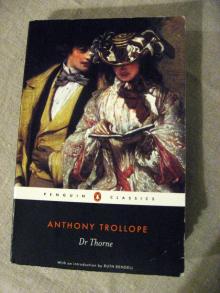 Doctor Thorne
Doctor Thorne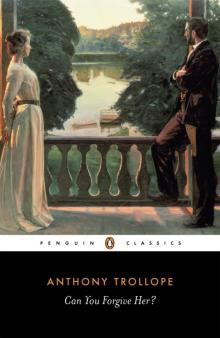 Can You Forgive Her?
Can You Forgive Her?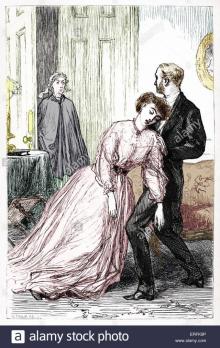 The Last Chronicle of Barset
The Last Chronicle of Barset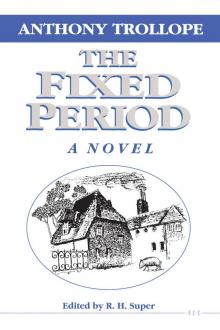 The Fixed Period
The Fixed Period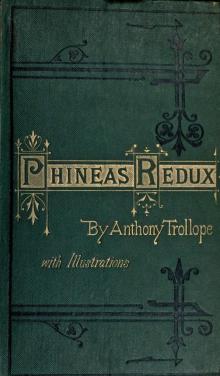 Phineas Redux
Phineas Redux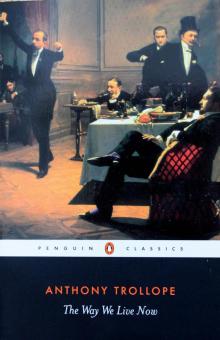 The Way We Live Now
The Way We Live Now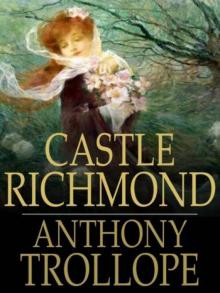 Castle Richmond
Castle Richmond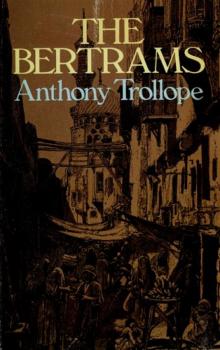 The Bertrams
The Bertrams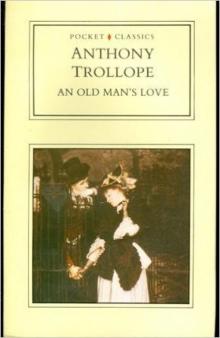 An Old Man's Love
An Old Man's Love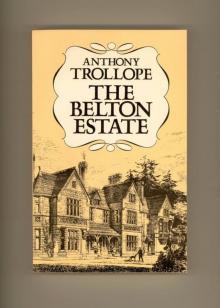 The Belton Estate
The Belton Estate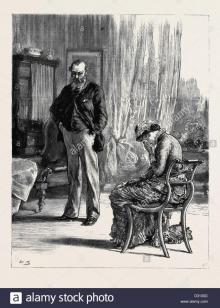 Marion Fay: A Novel
Marion Fay: A Novel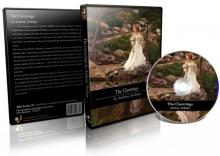 The Claverings
The Claverings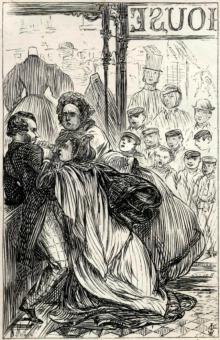 The Struggles of Brown, Jones, and Robinson
The Struggles of Brown, Jones, and Robinson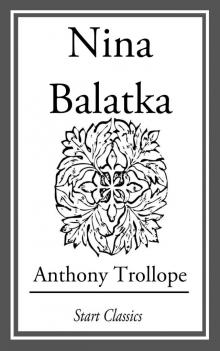 Nina Balatka
Nina Balatka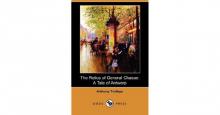 The Relics of General Chasse: A Tale of Antwerp
The Relics of General Chasse: A Tale of Antwerp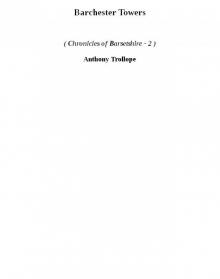 Barchester Towers cob-2
Barchester Towers cob-2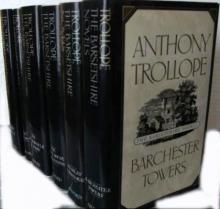 The Chronicles of Barsetshire
The Chronicles of Barsetshire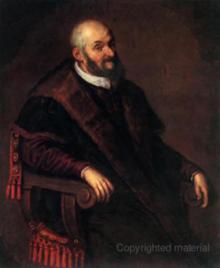 The Warden cob-1
The Warden cob-1 Framley Parsonage
Framley Parsonage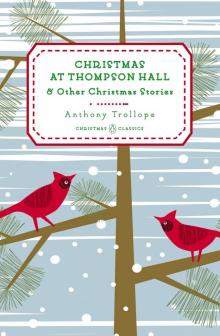 Christmas at Thompson Hall
Christmas at Thompson Hall The Warden
The Warden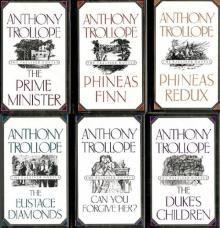 The Palliser Novels
The Palliser Novels The Small House at Allington
The Small House at Allington Barchester Towers
Barchester Towers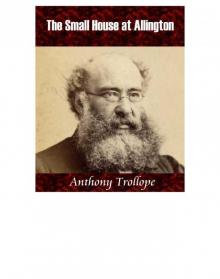 The Small House at Allington cob-5
The Small House at Allington cob-5 The Duke's Children
The Duke's Children Phineas Finn, the Irish Member
Phineas Finn, the Irish Member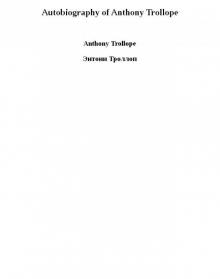 Autobiography of Anthony Trollope
Autobiography of Anthony Trollope